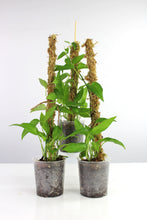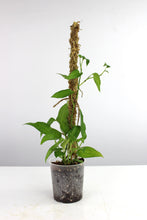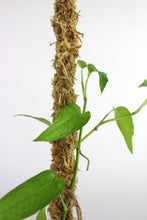Epipremnum pinnatum is part of Araceae family and its native range is Tropical & Subtropical Asia to Pacific. ‘Skeleton Key’ is thought to be a whole plant mutation of Epipremnum pinnatum, juvenile leaves are elliptical with entire margins, as the plant matures and climbs, leaves morph taking on the ‘Skeleton Key’ appearance.
Genus name comes from the Greek ‘epi’ meaning upon and ‘premno’ meaning stump, this is possibly in reference to the epiphytic nature of plants in this genus. Specific epithet means ‘feather-like’ in reference to the mature leaf shape.
Please note, each plant is numbered and the plant you select is the plant you will receive.
Pot: ø 9cm.
Height: Approximately 40cm from base of pot (including moss stick)
Light: Bright indirect light, meaning the plant sees the sun for 0-4 hours per day - this could be through trees or a translucent curtain, it’s important for the plant to see the sky in order to thrive. Although Epipremnum can survive in as low as 50 foot-candles, watering would have to be very infrequent in order to prevent rot and fungal infections and this cultivar would lose its bright colour.
Water: If you’re giving your plant bright indirect light, potting mix ought to be evenly moist.
If your plant is positioned in a much lower light spot, allow the majority of the mix to dry out. Before watering, ensure the substrate isn’t compacted, if it is, aerate it with a few pokes of a skewer or blunt stick, pour water slowly over the top and allow the water to pass through the drainage holes.
Potting mix: A well draining mix composed of coco coir, perlite or vermiculite, orchid bark and worm castings.
Fertilising: Feed your plant every other watering during the growing season or when you observe active growth. You can dilute fertiliser to half the recommended amount but never add more.
Temperature: 15-29°C, no lower than 12°C.
Humidity: Epipremnum would prefer higher humidity but do well to adapt to average home humidity. You can increase humidity by placing the plant on a watered pebble tray or using a humidifier.
Epipremnum pinnatum are toxic, keep out of reach of pets and children.





